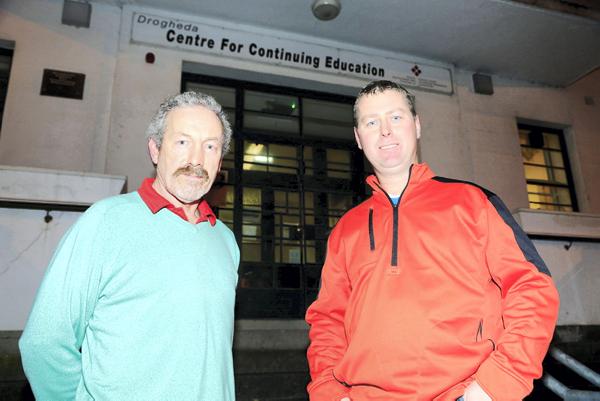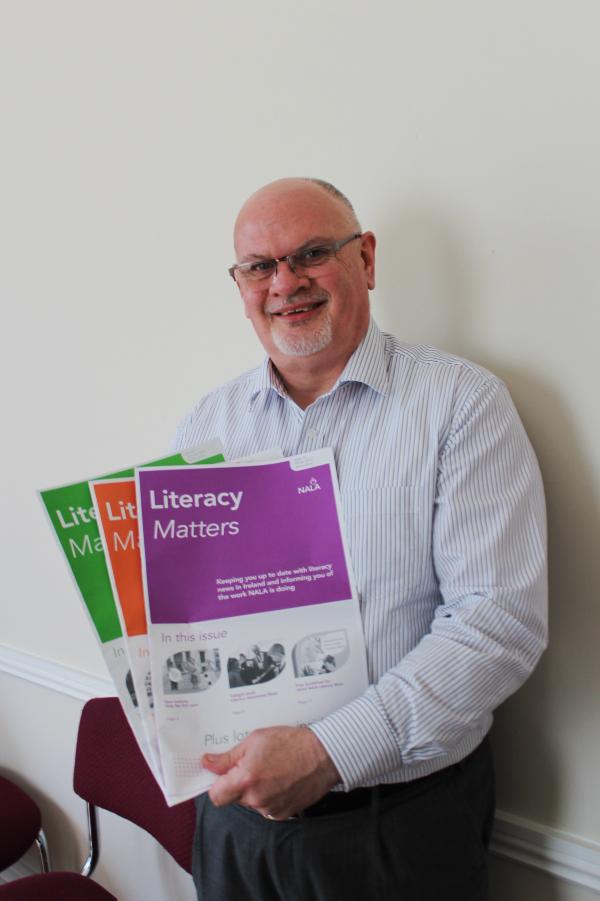When it comes to literacy in this country the statistics tell a lot. Results from an OECD Adult Skills Survey found that almost 18%, or one in six, of Irish adults are at or below level one, the lowest step on the five-level literacy scale. At this level, a person may be unable to read basic text and some of those people may not be able to write their own name. However, many adults with low literacy skills can read something, but find it hard to understand official forms and instructions.
The survey also shows that 25%, or one in four, of Irish adults are at or below level one for numeracy. At this level, a person may be unable to do a simple mathematical calculation.
Literacy difficulties affect people of all ages and from all backgrounds, and can happen for a variety of reasons. Some people may have left school confident about their numeracy and reading skills, but find that changes in their workplace and everyday life make their skills inadequate. Parents who have literacy difficulties may not be able to support their own children with their reading and writing. This can lead to the children falling behind and in turn having literacy difficulties. Country Living met two people who talked us through their literacy journey.
Tony Moloney
Tony Moloney from Killeagh in Co Cork says he was hiding his literacy difficulties all his life.
“I thought my wife and children didn’t know, but they did. It was very difficult trying to hide it. When I “came out” (which is how Tony describes it) it was a weight off my shoulders.”
Tony “came out” about his literacy difficulties four years ago, at the age of 53, and says he did so by accident.
“I worked as a self-employed taxi man for 40 years. All through the years, I couldn’t do a test and I didn’t have a CV because I couldn’t write one. When the slump came I didn’t know what to do. I was 53 years of age and I said: ‘What am I going to do for the rest of my life?’. I said I’d learn how to use a computer. A leaflet came in the door for a local education centre. Straight away the tutor learned that I had a problem with reading and writing.”
Tony left school in 1973 aged 16 and although he did the Inter Cert, he “failed if you like, because I couldn’t read or write”. He was, however, very good at maths and science, something he attributes to the fact that he has a great memory.
He says his literacy difficulties stem from a combination of things. Firstly, there were 57 people in his class the whole way up through primary school.
“It was only in secondary school they got us down to 25, 30. The teacher hadn’t a hope of taking control of 57 people. It was only years later that I realised all that.”
Tony started off with one-to-one tutoring in Youghal Adult Learning Centre and although he was terrified about moving into a classroom environment, he got through it.
“I’m always going to have a problem. It’s a slow process. Literacy, reading and writing is like fingerprints. It’s different for everybody,” says Tony.
But he’s made great progress. “I’d say 1000%. Confidence is the biggest thing – to say out loud that I have a problem. I wish I did it sooner. But you have to come to a stage yourself that you’re ready for it.
“There’s unbelievable fear in the pit of your stomach. I thought I was alone.
“My advice to those in a similar situation is to go and grab the opportunity, it will change your life. I was empowered really. These education centres are scattered all over the country. There’s a centre always near you. Education is the key to opening the door to everything and it’s only in the last three years I’ve learned that.”
Tony will be at the National Adult Literacy Agency (NALA) stand at the Ploughing from 1pm till 6pm, on the three afternoons of the championships.
“The kick I’m getting out of it is helping other people realise there’s nothing to be ashamed of,” says Tony.
“If I get one other person to do what I did, then it’s worthwhile.”
Richard McCormack
The day that Country Living spoke to Richard was a pretty big one. He had just received his Junior Certificate result for English.
“I never thought I’d have a Junior Cert,” says Richard. “I’m going to do Leaving Cert English next year. I’d advise anyone to go back and do it.”
Such a momentous day stands starkly in contrast with the many days over the years when Richard was put on the spot.
“I played minor football with my local club and I was handed a team sheet to read out. I would have been able to name the whole team off by heart without looking at a sheet, but I got so flustered. I was sweating, you feel like your being looked down on or something.”
Such an incident was one of many over the years where Richard used excuses such as: “I forgot my glasses”, to get out of reading, or telling his children to go “ask your Mammy”, when they asked him for help with their homework.
Richard was born in the 1950s and says school was not high on his list of priorities. He left at 13 and went making hay and picking spuds and turnips. He says it wasn’t unusual that people in his area would leave school without good reading and writing.
“My teachers were pensioners. The same people that taught my parents were teaching me. There were two classrooms with three classes in each. If you had any difficulty you weren’t helped along, you were holding up the class.”
Richard suffers from depression and he says his literacy difficulties used to get him down.
“I’d get embarrassed about my literacy, I’d want the ground to open up and swallow me.”
During a session with a psychiatrist who was seeing him for his depression, a goal was set for him – to do something about his literacy difficulties before the next session.
Although he had two weeks to complete the task, he went and did something that day. It wasn’t long before he was at the Louth/Meath Education and Training Board, where he started off with one-on-one tutoring for six months and then went into a classroom with four or five others.
“I was dreading going into the classroom,” says Richard. “I didn’t know what to expect. Would they be laughing at me? But it was great craic. It’s not like school. You’re not going in there for it to be beat in to you.”
Richard has also made great friends in his class and now plays golf with a new friend from the class, Dermot O’Brien: “He’s a Meath man with a Louth man’s name,” he laughs.
“I was hiding this [his literacy problems] for 40 years,” says Richard. “Then I got a new lease of life. My friend and I were on the Sean O’Rourke show a few months ago talking about literacy. I wouldn’t have been able to do that two years ago.
“I was ashamed of my life of the way I was. The last two years were amazing. I can see the difference in everyday life. I’ve more confidence in myself.
“I want to help other people in the same situation. I’m gone 59, nearly 60. I’m sorry I didn’t do it 30 years ago.”
Richard acknowledges all the great help he received from the tutors at the Louth/Meath Education and Training Board – Maria Morgan, Louise McFadden, Mareena Brannigan, Ruth Campbell and Angela Cahill.
Pop into the NALA stand at the Ploughing to meet Richard and Dermot from 11am until 4pm on Thursday, 25 September.
Adult courses
You can study online by yourself, work with a tutor on our Distance Learning Service or learn in your local ETB adult education centre. Or you can do a combination of these to suit your lifestyle. Ring NALA on 1800-202-065 or freetext “LEARN” to 50050. A friendly operator will be happy to talk to you. Everything is free and confidential. Otherwise, log on to www.writeon.ie and start learning today. There are over 50,000 adults improving their reading, writing and maths skills in local ETB adult education centres around the country.
Children’s courses
Parents who want to support their children’s learning may be interested in checking out the www.helpmykidlearn.ie website, which highlights the everyday things that children learn at home from their families. It has everything from card games and hopscotch, that help practise maths, to children’s e-books and apps for reading. All a parent has to do is enter their child’s age.







SHARING OPTIONS